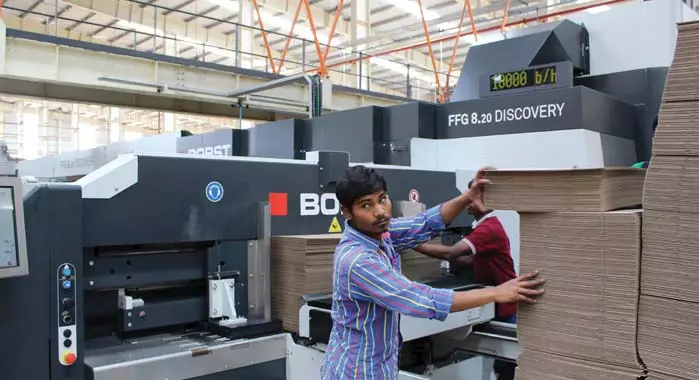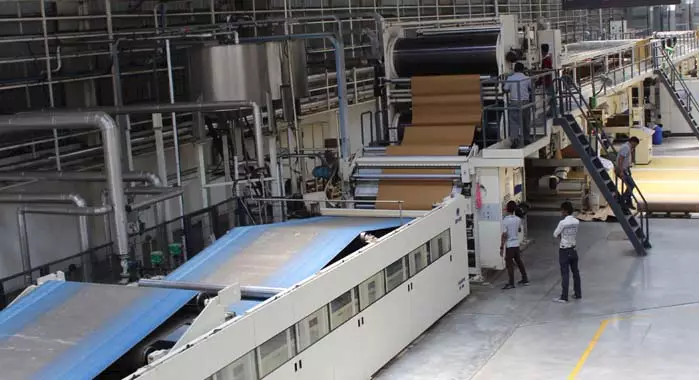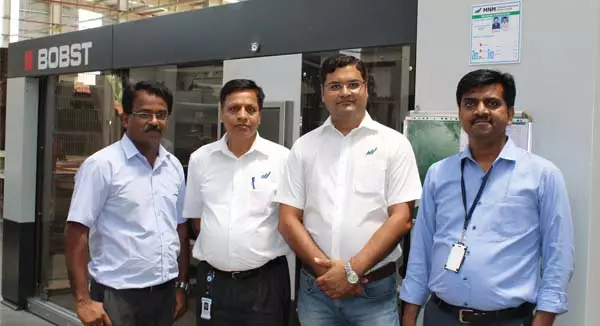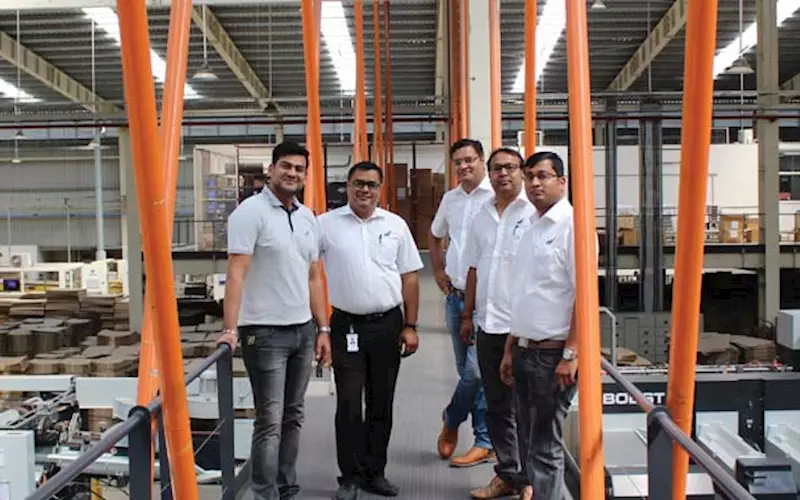Amid fluctuating kraft paper prices and the repercussions of demonetisation and GST, Indian corrugators have battled a brutal year, but experts say explosive growth lies ahead. The smart men at Bengaluru-based MNM Triplewall understand this. They also understand that online retail sector is an opportunity not to be missed. Therefore, they have set up one of the most modern corrugation plants in the country, reports Rushikesh Aravkar
Online shopping is fun and convenient. A few clicks here and there on your handheld device and your goods are already shipped. When the delivery arrives the following day, it’s unlikely that you have paid attention to the rugged yet neat brown box that has carried your goods safely all the way. Bengaluru-based MNM Triplewall Containers produces many of those.
From its latest factory located at Shoolgiri, 60 kilometres away from Bengaluru, MNM Triplewall manufactures three-lakh corrugated boxes a day. While 15% of its revenues come from online retailers, MNM also caters to the tertiary packaging requirements of food and beverage firms, FMCG companies, and pharma majors.
Advantage of proximity
It is amazing how the online retail stores with thousands of product SKUs on their eShelves manage with only 30 corrugated box SKUs. Of course the smart algorithms do all the computing hardwork. But projecting what the billions of customers will order during the day. This is something that artificial intelligence is yet to master. Therefore, managing the corrugated box inventory is a tough task for these online retailers. That’s where MNM chips in. MNM has realised that the key to tap the growing opportunity in the eCommerce space is being close to eCommerce warehouses. So much so that it has already set up two dedicated packaging material warehouses next to the warehouses of an eCommerce giant in Hyderabad and Bengaluru. Its third such warehouse, and second in Bengaluru, will go live soon. The 10,000 sq/ft warehouse in Hyderabad stocks inventory worth two days requirement and is constantly refilled from the Unit 3.
Early movers
Its promoters, the Agarwal, Gupta and Bothra families are optimistic about the way in which the eCommerce scene in the country is shaping the corrugation business. And why not? Online retail in India is estimated to grow over 1,200% to USD 200 billion (Rs12,98,610-crore) by 2026, up from USD 15 billion in 2016, according to a recent report by financial services firm Morgan Stanley. By then, online retail will account for 12% of India’s overall retail market, from just 2% in 2016.
However, barring a few early-movers, the corrugation industry doesn’t seem to be ready to handle the demand that the eCommerce boom will throw at them. Of the 12,000 odd corrugation businesses in the country only about 450 boast of automatic corrugation lines. Among these 450, majority of the operations comprise of Chinese or Taiwanese automatic corrugated board making lines and staggered semi-automatic finishing operations.
That’s because, until 2008, the corrugation segment was reserved for small scale industry (SSI) sector thereby limiting the infusion of capital and modern technology into the segment.
Only a handful of corrugation lines in India are “truly automatic”, which means the automation has seeped beyond board making into the finishing department; they comprise of automatic printer-slotters and flexo folder-gluers, and have minimum manual touch points from one end of the line to the other. Such a set-up is a defacto standard in order to produce good quality and consistent corrugated boxes and to match the scales of operation that the large corporations and multi-national companies seek.
MNM Triplewall is an early-mover. The Agarwals, Guptas, and Bothras have been in the corrugation business since the early nineties, independently running four different operations. When the government de-reserved the industry from a small-scale sector in 2008, the Agarwal families consolidated operations and formed HMK Auto Packs in 2009. Later the Bothra and Gupta families merged their businesses to form MNM Triplewall in 2011. By this time their semi-automatic operations had graduated to Chinese automatic lines.

Bobst FFG 8.20 Discovery
Amit Agarwal, who led HMK Auto Packs business at the time, recalls, “The industry was changing. By 2014, individually the two companies had peaked their capacities. We realised that the future will be technologically driven and advanced automation will play a vital role in the box business.”
“It was in November 2014, during an industry conference in New Delhi, Manish Gupta, who headed MNM Triplewall, and I attended a session on mergers, which was delivered by a professor from SP Jain institute. On the flight back, the two of us pondered over the idea and discussed the feasibility. After returning, both of us spoke to the stakeholders in our respective companies and crunched some numbers.”
Being in the same industry, the families knew one another for over two decades. Gupta, adds, “Everyone was on the same page. We all felt the need to create an infrastructure that is sustainable for the future and this seemed doable by joining forces. So within two months, a plan was chalked out and the two companies merged operations to form a new entity that is MNM Triplewall in its current form. This happened in early 2015.”
After the merger, HMK Auto Packs ceased to exist. The new entity bears the name of MNM Triplewall Containers. It will be rechristened as B&B Triplewall Containers, where B&B stands for box and board, in May 2018, informs Agarwal.
Today, the company operates two plants – Unit 1 is a seven-ply Chinese corrugation line and automatic finishing machines and Unit 3 that houses the latest machinery. The merger allowed for new investments and latest technology infusion.
This new plant started production in January 2017. The company has deployed a BHS Steady Line E five-ply corrugation line and a two-colour Bobst FFG 8.20 Discovery flexo folder-gluer. When this scribe visited the 1.5-lakh sq/ft shopfloor, the corrugator was churning out boards at the top speed of 180 metres per minute.

BHS Steady Line E
Today, MNM can produce 5.5-lakh boxes a day with an addition of another printer-slotter and a flexo folder-gluer. In terms of sqm area, it can produce seven million sqm of corrugated board.
“The Bobst FFG is a workhorse,” says Agarwal. “It runs at a speed of 18,000 boxes per hour. The set-up is quick and the operations are hassle-free.”
However, putting all this together was not an easy task for MNM. “Our biggest challenge was the know-how. There are no consultants in India who can help you set up automatic corrugation lines. We visited several plants in Europe and the United States to figure out the layout and other nitty-gritties of automatic operations,” says Agarwal.
“The other challenge is running a corrugator that is fast. You are not used to that speed. We have been comfortable with corrugators running at 80 metres per minute. When you upgrade the technology many things change. You are looking for better productivity and higher speed. It needs a different mindset altogether. It was a steep learning curve.”
Agarwal explains, “You can have the best set of equipment but if you don’t put right raw material into it, the equipment can do very little. The quality of kraft paper that Indian mills produce makes it difficult to run at speeds of 180 metres per minute. The least you expect from a kraft paper vendor is a reel of paper that is joint-free. But many a times the paper reels have breaks which are not even taped and this leads to stoppages on the corrugators.”
The Indian kraft paper manufacturers are realising that their paper is no longer suitable for the new corrugation lines. They are trying to upgrade. MNM conducts regular meetings with their vendors to discuss the issues with the paper quality and how it can be improved. “These meetings have been very helpful. We started checking paper and demanding certain parameters from the mills. The mills also proactively relooked at their operations. Ultimately, once you start demanding certain quality, your vendor will strive to match your demands,” says Gupta.
“With the modern machinery, there are plenty of value engineering opportunities to enhance the performance of the box. But for this to happen, corrugators should be designing the boxes. Instead of specifying the construction of the box, the customer should be looking at the performance of the box and leave the construction to the corrugators. That’s where we can add value by working with our paper mills and generating certain grade of paper that is suited for the application.
“We are nine months ahead of our timelines,” says Agarwal. “The target was to touch 2,700 tonnes of conversion by the end of first 12 months. However, we crossed 3,500 tonnes.” With current set of equipment, MNM aims to clock 4,500 tonnes of kraft paper conversion by the end of 2018. A glance at the shopfloor and one realises the constraint of space is creeping in. But MNM has ample amount of space for expansion, and has readied itself to ride the corrugation growth wave.
The Bobst story

Team MNM Triplewall with Bobst's Bhavesh Pingale (r)
MNM Triplewall is not the first company to invest in high-end automatic corrugation and flexo folder-gluer machines. According to Bobst, it has installed 10 flexo folder-gluers lines in India and another four FFG lines will be installed soon.
The first installation of a Bobst FFG transpired in 2013 at Pyramid Packaging, Bengaluru. It was a Bobst FFG 618 Quattro. Then in 2016, the country’s first FFG 1228 NT RS, high graphic flexo board line came at Astron Packaging in Ahmedabad.
The year 2015-2016 was a breakthrough year for Bobst with the sale of five FFG 8.20 Discovery lines. Most of these machines are either two-colour or four-colour lines. Most of these installations transpired in South India with leading names like Panoply Packaging, and South Indian Paper Mills, MNM Triplewall.
In addition, there is Girnar Packaging, Vijay Anand Packaging and the big ticket installation in 2017 the six-colour FFG 924NTRS at Meghdoot Packaging’s North India facility.














 See All
See All